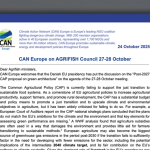
Press release in Serbian: Saopštenje za medije
Civil society to political leaders: The Western Balkans are part of Europe and need tangible climate change action to move away from fossil fuels
-
Ahead of the EU-Western Balkan leaders’ meeting, NGOs claim in a letter to EU and Western Balkan officials that the Green Agenda for the Western Balkans has made only limited progress in the past two years and ask for more concrete steps forward.
-
Projects proposed for funding under the Economic and Investment Plan for the Western Balkans must be climate-change proofed to achieve climate neutrality by mid century.
-
NGOs are asking the leaders to ensure the process is transparent, time-bound and with participation of all stakeholders.
Brussels, 22 June 2022 – Ahead of the EU-Western Balkans leaders’ meeting on June 23rd in Brussels, civil society organisations from across the Western Balkans have expressed concern about the lack of progress in implementing the goals set out in the Green Agenda for the Western Balkans, which was signed by regional leaders two years ago in Sofia. In the letter sent to EU and Western Balkan leaders, NGOs warn that the process lacked transparency and engagement from all interested parties, including the civic sector, resulting in an ambiguous Action Plan that has yielded few outcomes to date. The letter urges leaders in the EU and the Western Balkans to come up with realistic, time-bound, and ambitious measures to decarbonize the region and ensure the financial means for a just transition.
A total of 9 billion EUR was approved last year at the Brdo Summit in Slovenia to implement the Green Agenda for the region. However, in contrast with the urgent need to address climate emergency and energy security issues, governments in the Western Balkans are still proposing to build new gas and coal infrastructure projects, which will only serve to maintain the region’s fossil fuel status quo and worsen the climate crisis. These projects, funded partially by the EU taxpayer and contrary to the climate neutrality goals, will be financed through the Western Balkans Economic and Investment Plan, part of the Instrument for Pre-Accession to the European Union. In the letter, civil society organisations call for better collaboration among all relevant coordinating partners, including the Regional Cooperation Council, the Energy Community Secretariat, and other political and financial actors to ensure sustainability of any future investments.
“The Western Balkans are a vital part of the European continent and the EU leaders must increase their support to ensure the region’s energy security and independence from fossil fuels – today even more crucial in the context of the Russian war against Ukraine. The EU’s taxpayer-funded assistance to the region must be consistent with the EU’s goal of achieving a carbon-neutral continent and the Paris Agreement. It is critical that political declarations be followed by actual steps that correspond to European values and decarbonisation targets”, says Chiara Martinelli, Director of CAN Europe.
Reasons to take urgent action are numerous and grave. The economic and environmental negative impacts of the Western Balkans’ outdated coal power plants are staggering. While governments subsidise the plants and allow unsustainable investments from China, experts confirm that air pollution (a serious problem in countries in the Western Balkans) has staggering health impacts for citizens in the region, including premature deaths.
”EU and Western Balkan leaders urgently need to commit to integrated and effective protective measures to significantly reduce the severe health harm from fossil fuels in the region. Health needs to be at the centre of any decision-making in the sustainable energy transition,” says Vlatka Matković, Senior Health and Energy Officer at the Health and Environment Alliance (HEAL).
It is critical to begin the transition to renewable energy sources as soon as possible, together with energy savings and energy efficiency improvements and sufficient community support for those who will be most affected. It’s a dead end road, as seen by global coal redundancy and energy security concerns that afflicted practically all Western Balkans countries over the winter months. Postponing climate action or neglecting it is no longer an option, if we are to save the planet and the people. Fossil fuels are the primary reason why our planet is warming to dangerous levels, and must remain in the ground. The letter concludes highlighting readiness and ability of the undersigned civil society from the Western Balkans to continue to play a constructive role in the process of forging a shared future that is both healthy and secure.
ENDS
References for editors
Sofia Declaration, November 2020, where the Green Agenda for the Western Balkans was adopted https://www.rcc.int/docs/546/sofia-declaration-on-the-green-agenda-for-the-western-balkans-rn
Brdo Summit in Slovenia, October 2021, where the Action Plan for the Green Agenda for the Western Balkans was adopted https://ec.europa.eu/neighbourhood-enlargement/news/brdo-declaration-6-october-2021-2021-10-06_en
Action Plan for the Green Agenda for the Western Balkans, adopted in October 2021, https://balkangreenenergynews.com/wp-content/uploads/2021/10/GAWB-ACTION-PLAN-Final-04.10.2021.pdf
Western Balkans: An Economic and Investment Plan to support the economic recovery and convergence https://ec.europa.eu/commission/presscorner/detail/en/ip_20_1811
Western Balkan countries need a dedicated fund to ensure a just energy transition, report by the Green Tank and Banwatch, January 2022 https://thegreentank.gr/en/2022/01/11/just-transition-fund-western-balkans/
Contact
Masha Perovic, Communications Coordinator for Southeastern Europe, Masha.perovic@caneurope.org Mob: Viber/WhatsApp/Signal +381638411566



